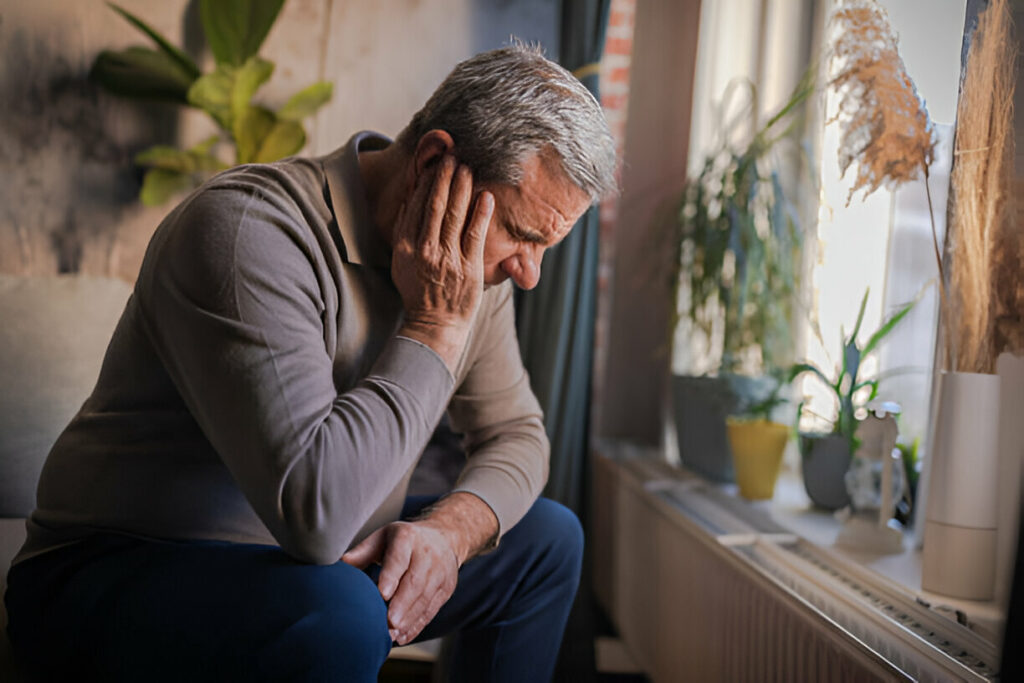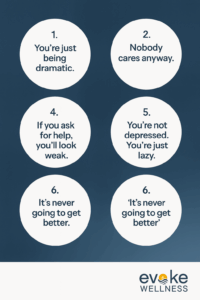If you’re young, sober, and low-key spiraling—it’s not all in your head.
Okay, technically it is. But not because you’re “being dramatic” or “overthinking things.” Depression messes with your mind in a way that can make it nearly impossible to trust yourself. Especially when you’re the only one in your group chat not drinking, not numbing, and not pretending everything’s fine.
When you’re already the “weird one” for staying sober, feeling broken just makes everything feel worse. You might be thinking about asking for help—but depression has this way of jumping in and telling you a thousand reasons why you shouldn’t.
So let’s call out six of its most common lies. You might recognize them. And once you name them, you can start unlearning them.
1. “You’re just being dramatic.”
This lie usually shows up when you’re crying in the bathroom for no clear reason. Or when you can’t explain why you haven’t replied to texts in days. Depression gaslights you into thinking that your pain isn’t real pain.
But depression isn’t about having a “bad day” or being moody. It can be a medical condition with roots in brain chemistry, trauma, genetics—or all three. And like any other health issue, it deserves real support.
If you’ve been struggling with motivation, sleep, eating, or just the ability to care—those are symptoms. And they don’t make you dramatic. They make you someone who might benefit from a depression treatment program.
2. “Nobody cares anyway.”
This one is brutal. Depression isolates you, then whispers that you’re better off alone. You might stop reaching out because you’re convinced people are just being polite. That they don’t really want to hear from you. That you’re too much—or not enough.
But here’s the deal: people don’t need you to be perfect. They need you to be real. And asking for help isn’t a burden—it’s a brave move. Even if it feels awkward. Even if your voice shakes.
Sometimes the first person you talk to won’t have the right words. That’s okay. The goal isn’t to find the perfect person—it’s to find a person who gets it. That might be a friend. A therapist. A peer support group. Or someone in a depression treatment program who knows how to actually listen.
3. “You should be able to fix this yourself.”
Welcome to the toxic productivity spiral: the belief that if you just journaled harder, meditated longer, or pushed yourself more—you’d be fine.
But depression is sneaky. It convinces you that needing help makes you weak or unworthy. It shames you for not being able to self-heal.
Let’s be real: if depression could be cured by positive vibes and a playlist, none of us would be here. Sometimes it takes professional help. Therapy. Medication. Peer support. A full-on treatment program. Not because you’re broken, but because your brain’s chemistry might need a hard reset—and that’s not something you can do alone.
At Evoke Wellness in San Marcos, our depression treatment program meets you where you are. No shame. No pressure. Just real tools that actually work.
4. “If you ask for help, you’ll look weak.”
False. You know what’s actually weak? A system that taught you to hide your feelings and pretend everything’s fine.
Asking for help doesn’t mean you’re falling apart. It means you’re self-aware enough to know when something’s off—and strong enough to want better. That’s emotional intelligence, not failure.
Besides, if someone makes you feel small for trying to get help? That’s on them. Not you.
Seeking treatment—whether that’s one-on-one therapy, group support, or a structured program—isn’t a last resort. It’s a power move.
5. “You’re not depressed. You’re just lazy.”
This one might feel personal. Like when the dishes pile up, or when you cancel plans (again), or when you literally can’t make yourself shower.
Depression disguises itself as laziness. But that’s not what’s happening. You’re not avoiding things because you don’t care—you’re avoiding them because your brain feels stuck. Like trying to run a marathon with bricks strapped to your legs.
If your body feels heavy, your motivation’s gone, and everything takes five times the effort—that’s not laziness. It’s exhaustion. It’s overwhelm. It’s depression lying to you.
And that lie? It’s keeping you from reaching for something better.
6. “It’s never going to get better.”
This is depression’s favorite. It’s the lie that sets up camp in your chest. The one that feels like truth when you’re lying in bed staring at the ceiling, wondering what the point is.
But here’s the thing about depression: it doesn’t tell the future. It tells fears.
Recovery isn’t linear. Some days it’s messy. Some days it sucks. But change is possible. There are people who felt exactly the way you feel right now—and they got through it. Not by faking positivity. But by getting help, step by step, until the fog started to lift.
A depression treatment program doesn’t promise miracles. But it offers tools. Connection. Relief. And that can be enough to get you to the next moment. Then the next.
Real Talk from Someone Who’s Been There
“I used to think if I asked for help, it meant I’d failed at being ‘okay.’ Turns out, asking for help is what finally gave me a shot at feeling like myself again.”
– Outpatient Client, 2023
FAQs About Depression and Getting Help
What are the signs that I might need a depression treatment program?
If you’re feeling consistently low, numb, exhausted, or overwhelmed—and it’s impacting your relationships, school, work, or daily life—it might be time to explore professional support. You don’t need to “hit rock bottom” to deserve help.
Is treatment just therapy, or is there more to it?
A depression treatment program often includes individual therapy, group sessions, psychiatric support, and holistic approaches (like mindfulness or movement). The goal is to treat you—not just your symptoms.
Can I join a program if I’m already sober?
Yes. In fact, being sober can actually make treatment more effective, because you’re more emotionally available to engage. Programs like the one at Evoke Wellness in San Marcos are designed to meet you where you are—sober, struggling, or somewhere in between.
I don’t want to take medication. Is that required?
Nope. Medication is one tool among many. Some people find it helpful, others don’t. The best programs give you options and talk you through them without pressure.
What if I start, and I hate it?
That’s okay. You’re allowed to advocate for yourself. You can try different providers or approaches until something fits. Starting treatment isn’t a commitment to stick with something that doesn’t help—it’s a commitment to not give up on yourself.
You Don’t Have to Keep Doing This Alone
If any part of this hit close to home, it might be time to talk to someone who gets it. Call (888) 450-2285 or visit Contact Us to learn more about our depression treatment program services in San Marcos, Texas.



